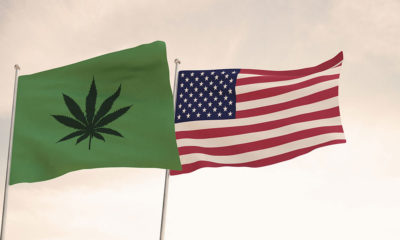
Legal
America’s Rotten Drug Laws Encourage ‘Synthetic Marijuana’ Use
As long as cannabis is illegal, and as long as organizations test for drugs, people will use K2 and Spice — and they will go crazy or die. Or both.
The line at The Last Place on Earth, a head shop in Duluth, Minnesota, stretched so far out the door it took a half-hour to reach the counter. The product for sale was so popular, buyers sold their own blood plasma to get some — despite side effects including hallucinations, paranoia, and outbursts of uncontrollable, inexplicable violence.
And despite all that, the product in question, synthetic “marijuana,” was — at least arguably — legal to sell.
“Arguably,” because it’s not. Synthetic cannabinoids are banned substances under federal drug-control laws, and both the federal Drug Enforcement Administration and local police have the ability to arrest anyone selling it.
“Arguably,” because despite all that, in 2018, synthetic “marijuana” is still sold openly at gas stations, convenience stores, and head shops, despite killing four people in the Chicago area since February, and killing two U.S. Marines and delivering another soldier brain damage.
As Minneapolis City Pages reported, The Last Place on Earth’s owner raked in “tens of thousands of dollars a day” off of the sale of the synthetic product — sold in shiny packages as K2, Spice, or other fancy names — before he was eventually arrested, tried, and convicted in 2014.
Yet somehow, the country’s Spice problem has only worsened since then.
On Wednesday, authorities in Chicago confirmed that a 22-year-old man died March 28 after consuming a particularly nasty batch of synthetic marijuana tainted with rat poison — the fourth death since last month from the stuff, which is “commonly sold” at convenience stores around the state, according to the Chicago Tribune.
So far this year, 155 people in Illinois have been sickened from using the drug. Last fall in Minnesota, 177 people went to hospitals after using synthetic “marijuana” during a three-week span, according to City Pages. And all this follows the ghastly scene in New York City in the summer of 2016, when first responders encountered users in a “zombie-like” state.
What’s going on here, and what’s the solution? America’s blinkered drug laws still treat synthetic “marijuana” too much like the real thing. At the same time, American institutions, like courts, employers, and the military, still screen for THC metabolites. They don’t test for synthetic substitutes, which means synthetic “marijuana” is not punished as stridently, despite being literally deadly.
Meanwhile, merchants are evidently emboldened enough to continue selling Spice, and enough people are happy to use it to keep them in business.
Imagine, for just a second, a gas station or liquor store selling real marijuana — and imagine how quickly police would swoop in. It would not last an afternoon.
The solution, without compounding the country’s prison problem, must be a combination of state and societal encouragement and discouragement.
Merchants must be discouraged from selling the stuff, and potential users in search of chemical alteration must be encouraged to use the much safer real thing.
Broadly speaking, synthetic cannabinoids are any lab-made chemical designed to mimic real plant-based cannabinoids’ ability to bind to the human body and brain’s endocannabinoid receptors, which regulate core functions including mood, appetite and sleep.
Created during the 1980s by pharmaceutical companies looking to create drugs with cannabis’s unique combination of efficiency and effectiveness, synthetic cannabis’s formulas were published in medical journals. This made the information available to underground chemists and to unscrupulous merchants, who spray them onto plant material and package them for sale.
In Illinois, where synthetic marijuana is currently killing people, both synthetic “marijuana” and real cannabis are punished under the same criminal statute. This must be changed, as the risk posed by synthetic marijuana is deadly. If nothing else, in the near future, real cannabis should be decriminalized, with Spice kept in the same statute.
No advocate of marijuana legalization or opponent of the prison-industrial complex could honestly argue for more people in jail, but surely there is some level of punishment appropriate for someone who knowingly sells potentially deadly fake marijuana. In addition, they certainly should be punished more severely than someone selling real marijuana.
Probation departments and employers must do their part by ceasing to test for THC metabolites. Failing that, they could at least raise the threshold. To fail to address the problem by doing some combination of the above is to sentence people an excruciating and altogether predictable death.
TELL US, are you concerned about synthetic marijuana?

























